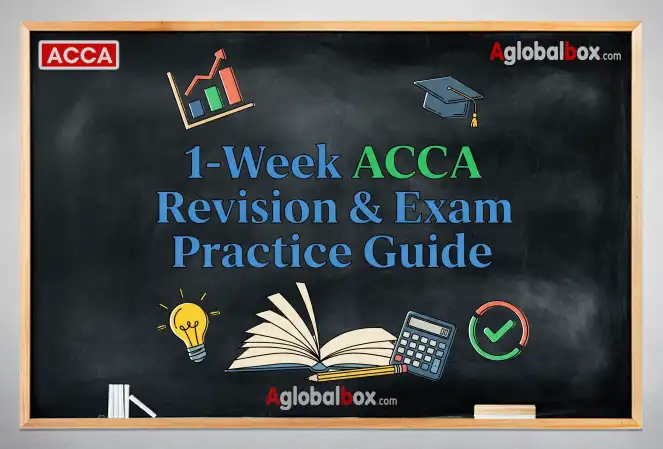Are you searching for comprehensive F1 Practice and Exam Kit Business and Technology – BT resources to excel in your ACCA studies? The journey to becoming a qualified chartered accountant requires dedication, proper planning, and access to quality study materials that can transform your preparation experience.
The ACCA F1 Business and Technology paper serves as the foundation for your professional accounting journey. With the right KAPLAN materials and strategic approach, you can master this crucial examination and build confidence for advanced papers. This guide explores everything you need to know about F1 preparation, from understanding the syllabus to implementing effective study strategies.
Understanding ACCA F1 Business and Technology Module
| Exam Details | Information |
|---|---|
| Exam Duration | 2 hours |
| Question Format | Multiple choice questions |
| Total Questions | 50 questions |
| Pass Mark | 50% |
| Examination Method | Computer-based |
| Prerequisites | None |
The F1 Business and Technology module introduces fundamental business concepts that form the backbone of professional accounting. This paper covers essential areas including business organizations, accounting systems, internal controls, and leadership principles.
Core Syllabus Areas
The F1 syllabus encompasses six primary sections that you must master:
Business Organization and Environment forms the foundation, covering organizational structures, stakeholder relationships, and business functions. You’ll explore different types of business entities, their characteristics, and how external factors influence organizational decisions.
Accounting and Finance Function focuses on the role of accounting within organizations. This section examines financial reporting requirements, management accounting principles, and the importance of accurate record-keeping in business operations.
Managing Technology and Information addresses the growing importance of technology in modern business. You’ll study information systems, data security, and how technology supports business processes and decision-making.
People and Performance explores human resource management principles, including recruitment, training, performance management, and organizational behavior concepts that drive business success.
Learning Outcomes and Objectives
Upon completing F1 studies, you should demonstrate comprehensive understanding of business operations, organizational structures, and fundamental accounting principles. The examination tests your ability to apply theoretical knowledge to practical business scenarios.
The module prepares you for advanced ACCA papers by establishing core competencies in business analysis, problem-solving, and critical thinking. These skills prove invaluable throughout your professional accounting career.
How Difficult is F1 Business and Technology to Study and Pass?
The F1 Practice and Exam Kit Business and Technology – BT presents moderate difficulty levels for most students. Success depends largely on your study approach, time management, and familiarity with business concepts.
Difficulty Assessment
Most students find F1 manageable compared to advanced ACCA papers. The multiple-choice format reduces complexity, allowing you to demonstrate knowledge without extensive written explanations. However, the breadth of topics requires systematic study planning.
Time Requirements: Typical students need 150-200 study hours to prepare adequately for F1. This timeframe varies based on your business background and study efficiency.
Common Challenges include memorizing extensive factual information, understanding interconnected business concepts, and applying theoretical knowledge to practical scenarios. The examination tests both recall and application abilities.
Success Factors
Your success in F1 depends on several critical factors:
Consistent Study Schedule: Regular, focused study sessions prove more effective than intensive cramming periods. Allocate specific time slots for F1 preparation and maintain discipline throughout your study period.
Active Learning Techniques: Engage with materials through note-taking, concept mapping, and regular self-testing. Passive reading rarely produces lasting retention of complex business concepts.
Practice Question Engagement: Regular exposure to examination-style questions builds familiarity with question formats and improves time management skills during the actual examination.
Why Choose KAPLAN for F1 Preparation
KAPLAN stands as the preferred choice for ACCA students worldwide, offering comprehensive study materials that align perfectly with examination requirements. Their expertise in professional education spans decades, making them a trusted partner in your ACCA journey.
KAPLAN’s Competitive Advantages
Curriculum Alignment: KAPLAN materials follow the official ACCA syllabus precisely, ensuring you study relevant content that directly relates to examination questions. Their materials undergo regular updates to reflect syllabus changes and emerging business trends.
Expert Authorship: Industry professionals and experienced educators develop KAPLAN content, bringing practical insights and real-world examples that enhance your understanding of complex business concepts.
Quality Assurance: Rigorous quality control processes ensure accuracy, consistency, and clarity across all KAPLAN materials. You can trust that information presented aligns with current business practices and ACCA requirements.
Student Success Rates
Students using KAPLAN materials consistently achieve higher pass rates compared to those relying on alternative resources. The structured approach and comprehensive coverage contribute significantly to examination success.
Proven Track Record: Thousands of successful ACCA candidates attribute their achievements to KAPLAN’s systematic approach and quality resources. The materials have supported countless professionals in advancing their careers.
Continuous Improvement: KAPLAN regularly solicits feedback from students and instructors, continuously refining their materials to address common learning challenges and enhance effectiveness.
Benefits of Using PDF Practice, Revision, and Exam Kits
PDF materials offer unprecedented flexibility and accessibility for modern ACCA students. These digital resources transform your study experience through convenience, portability, and enhanced functionality.
Accessibility and Convenience
PDF format enables studying anywhere, anytime, using various devices including laptops, tablets, and smartphones. You can access your F1 Practice and Exam Kit Business and Technology – BT materials during commutes, breaks, or whenever opportunities arise.
Search Functionality: Digital materials allow instant keyword searches, helping you quickly locate specific topics, concepts, or practice questions. This feature proves invaluable during revision periods and when clarifying doubts.
Annotation Capabilities: Most PDF readers support highlighting, note-taking, and bookmarking features that personalize your study experience. You can create a customized study guide tailored to your learning needs.
Cost-Effective Learning
PDF materials typically cost less than printed alternatives while offering identical content quality. This affordability makes comprehensive study resources accessible to students with varying budgets.
Environmental Benefits: Digital materials reduce paper consumption and shipping requirements, supporting environmentally conscious studying while maintaining full functionality.
Instant Access: Immediate availability eliminates waiting periods associated with physical deliveries, allowing you to begin studying immediately after purchase.
Enhanced Study Features
Modern PDF study materials include interactive elements that traditional books cannot offer:
Hyperlinked Content: Quick navigation between chapters, sections, and related topics enhances study efficiency and helps you understand connections between different syllabus areas.
Multi-Device Synchronization: Cloud-based PDF readers synchronize your progress, notes, and bookmarks across devices, ensuring seamless study continuity regardless of your location or device.
Strategic Planning for F1 Success
Effective planning forms the foundation of successful F1 preparation. Your study plan should balance comprehensive coverage with efficient time utilization, ensuring you’re fully prepared for examination day.
Creating Your Study Timeline
Assessment Phase: Begin by evaluating your current knowledge level through diagnostic tests or preliminary practice questions. This assessment identifies strengths and areas requiring additional attention.
Time Allocation: Distribute study hours across syllabus sections based on their examination weightings and your comfort level with each topic. Allocate more time to challenging areas while maintaining coverage of familiar topics.
Milestone Setting: Establish weekly and monthly goals that track your progress through the syllabus. Regular milestone reviews help maintain momentum and identify necessary adjustments to your study plan.
Resource Organization
Organize your KAPLAN materials systematically to maximize study efficiency:
Digital Library Setup: Create organized folders for different syllabus sections, practice questions, and revision notes. Logical organization saves time and reduces study session preparation requirements.
Progress Tracking: Maintain records of completed chapters, practice question scores, and areas requiring additional review. This tracking system guides your study focus and ensures comprehensive coverage.
Balancing Study Components
Effective F1 preparation balances multiple study components:
Content Learning: Allocate 60% of study time to understanding new concepts, theories, and business principles covered in the syllabus.
Practice Questions: Dedicate 30% of time to answering examination-style questions that test your knowledge application and build examination technique.
Revision Activities: Reserve 10% for reviewing completed topics, reinforcing key concepts, and addressing identified knowledge gaps.
How to Effectively Prepare for ACCA F1 Exam
Successful F1 Business and Technology preparation requires systematic approaches that maximize retention and application abilities. Your preparation strategy should encompass content mastery, question practice, and examination technique development.
Content Mastery Strategies
Active Reading Techniques: Engage with study materials through questioning, summarizing, and relating concepts to real-world business examples. Active engagement promotes deeper understanding than passive reading.
Note-Taking Systems: Develop consistent note-taking formats that highlight key concepts, definitions, and relationships between topics. Well-organized notes serve as valuable revision tools.
Concept Mapping: Create visual representations of complex topics showing relationships between different concepts. These maps help you understand how various business elements interconnect.
Question Practice Methodology
Progressive Difficulty: Start with basic practice questions to build confidence, gradually progressing to more complex scenarios that mirror examination standards.
Timed Practice Sessions: Regularly complete questions under time pressure to develop examination pace and identify areas where you need to improve speed or accuracy.
Answer Analysis: Review both correct and incorrect answers thoroughly, understanding why certain options are right or wrong. This analysis deepens your comprehension of examination requirements.
Examination Technique Development
Time Management: Practice allocating appropriate time per question during mock examinations. F1’s 50 questions in 120 minutes require efficient time distribution to complete all questions.
Question Analysis: Develop skills in quickly identifying key information within questions and eliminating obviously incorrect multiple-choice options to improve your success rate.
Stress Management: Practice relaxation techniques and positive visualization to maintain calm composure during the actual examination.
Essential Study Techniques for Business and Technology
The F1 Practice and Exam Kit Business and Technology – BT requires specific study approaches that align with business education principles and examination requirements.
Memory Enhancement Techniques
Spaced Repetition: Review materials at increasing intervals to strengthen long-term retention. This technique proves particularly effective for memorizing business terminology and factual information.
Mnemonic Devices: Create memorable acronyms or phrases to recall complex lists or processes. For example, use “PEST” to remember Political, Economic, Social, and Technological factors in business environment analysis.
Association Methods: Link new concepts to familiar experiences or previously learned information. These connections create stronger memory pathways and improve recall during examinations.
Application-Based Learning
Case Study Analysis: Practice applying theoretical concepts to realistic business scenarios. This approach mirrors examination questions and develops critical thinking skills.
Role-Playing Exercises: Consider business situations from different stakeholder perspectives to understand various viewpoints and decision-making factors.
Current Events Integration: Connect study topics to contemporary business news and developments, making abstract concepts more concrete and memorable.
Last-Minute Guide for F1 Preparation
When examination day approaches, focused revision strategies can significantly impact your performance. The last-minute preparation phase should consolidate your knowledge and boost confidence rather than introduce new concepts.
Final Week Strategy
Intensive Revision: Focus on reviewing key concepts, formulas, and definitions rather than learning new material. Your final week should reinforce existing knowledge and address any remaining weak areas.
Mock Examination Practice: Complete full-length practice examinations under timed conditions to simulate the actual examination experience and identify last-minute areas for improvement.
Stress Reduction: Maintain regular sleep schedules, engage in light physical activity, and practice relaxation techniques to ensure optimal mental state for examination day.
Day-Before Preparation
Light Review: Briefly review key concepts and formulas without intensive studying that might increase anxiety or confusion.
Practical Preparation: Organize examination materials, confirm location and timing details, and prepare everything needed for examination day.
Mental Preparation: Visualize successful examination completion and maintain positive mindset through affirmations and confidence-building activities.
Examination Day Protocol
Time Management: Arrive early, read instructions carefully, and allocate time appropriately across all questions. Don’t spend excessive time on difficult questions at the expense of easier ones.
Question Strategy: Answer questions you’re confident about first, then return to challenging ones if time permits. This approach maximizes your score potential.
Stress Management: Use breathing techniques and positive self-talk to maintain calm focus throughout the examination period.
Key Takeaways for F1 Success
- Systematic Planning: Develop and follow a structured study plan that covers all syllabus areas with appropriate time allocation
- Quality Resources: Utilize KAPLAN materials and PDF resources for comprehensive, flexible study options
- Active Learning: Engage with materials through note-taking, practice questions, and application exercises
- Regular Practice: Complete numerous practice questions to develop examination technique and identify knowledge gaps
- Time Management: Master efficient time allocation during both study sessions and the actual examination
- Stress Management: Maintain healthy study habits and develop coping strategies for examination anxiety
“Success in ACCA F1 comes not from last-minute cramming, but from consistent, strategic preparation using quality materials and proven study techniques.”
Frequently Asked Questions
Q: How long should I study for the F1 examination? A: Most students require 150-200 study hours spread over 8-12 weeks for adequate preparation. Your timeline may vary based on business background and study intensity.
Q: Are PDF materials sufficient for F1 preparation? A: High-quality PDF materials from reputable providers like KAPLAN provide comprehensive coverage sufficient for examination success when combined with regular practice.
Q: What’s the best way to practice multiple-choice questions? A: Practice regularly under timed conditions, analyze both correct and incorrect answers thoroughly, and track your progress across different syllabus areas.
Q: How important is business experience for F1 success? A: While business experience helps, it’s not essential. The examination tests fundamental concepts that can be learned through dedicated study regardless of professional background.
Q: Should I focus more on theory or practice questions? A: Balance both components with approximately 60% time on content learning and 40% on practice questions and revision activities.
Q: How can I improve my weak areas in the final weeks? A: Identify specific weak topics through practice question performance, focus additional study time on these areas, and seek clarification through study groups or online resources.
Conclusion
The F1 Practice and Exam Kit Business and Technology – BT represents your gateway to ACCA qualification success. Through strategic planning, quality KAPLAN materials, and systematic preparation approaches, you can master this fundamental paper and build confidence for advanced studies.
Success in F1 requires commitment to consistent study habits, engagement with comprehensive PDF resources, and regular practice with examination-style questions. The investment you make in thorough preparation pays dividends not only in examination success but also in building foundational knowledge for your professional accounting career.
Your journey toward ACCA qualification begins with F1 mastery. Embrace the challenge, utilize proven study strategies, and trust in your ability to succeed. With dedication and the right resources, you’ll confidently approach examination day knowing you’ve prepared thoroughly for success.






